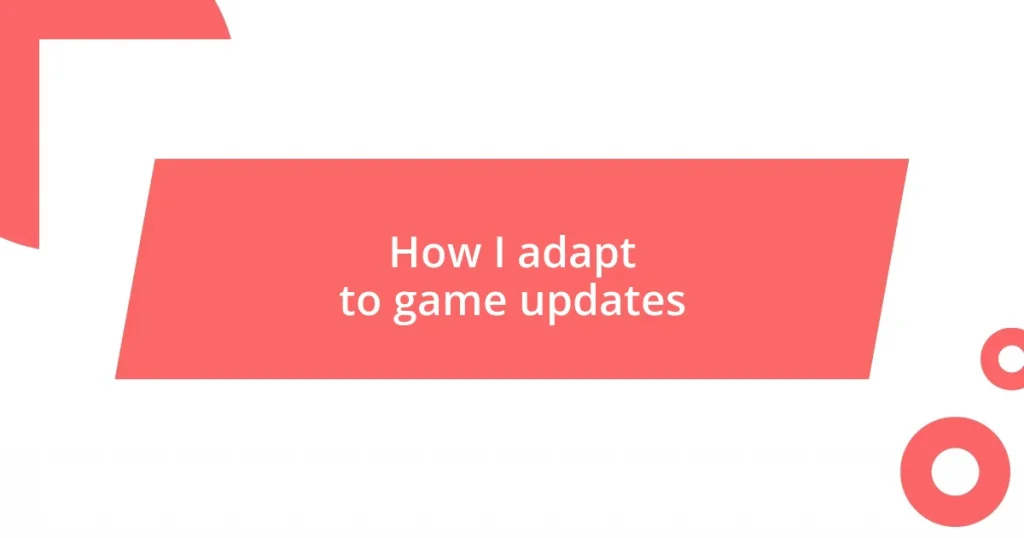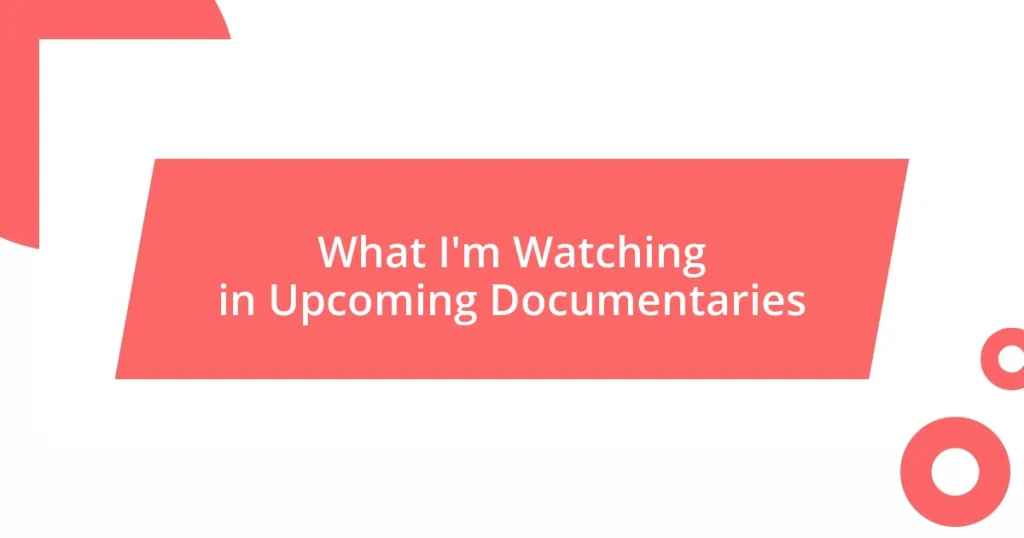Key takeaways:
- Video game updates can enhance gameplay through new features but may also introduce bugs and alter strategies, requiring players to adapt.
- Engaging with community feedback and staying informed via developers’ communications enriches the gaming experience and fosters connections within the gaming community.
- Tracking long-term trends and reflecting on personal gaming experiences help players understand the evolution of gameplay mechanics and enhance overall enjoyment.
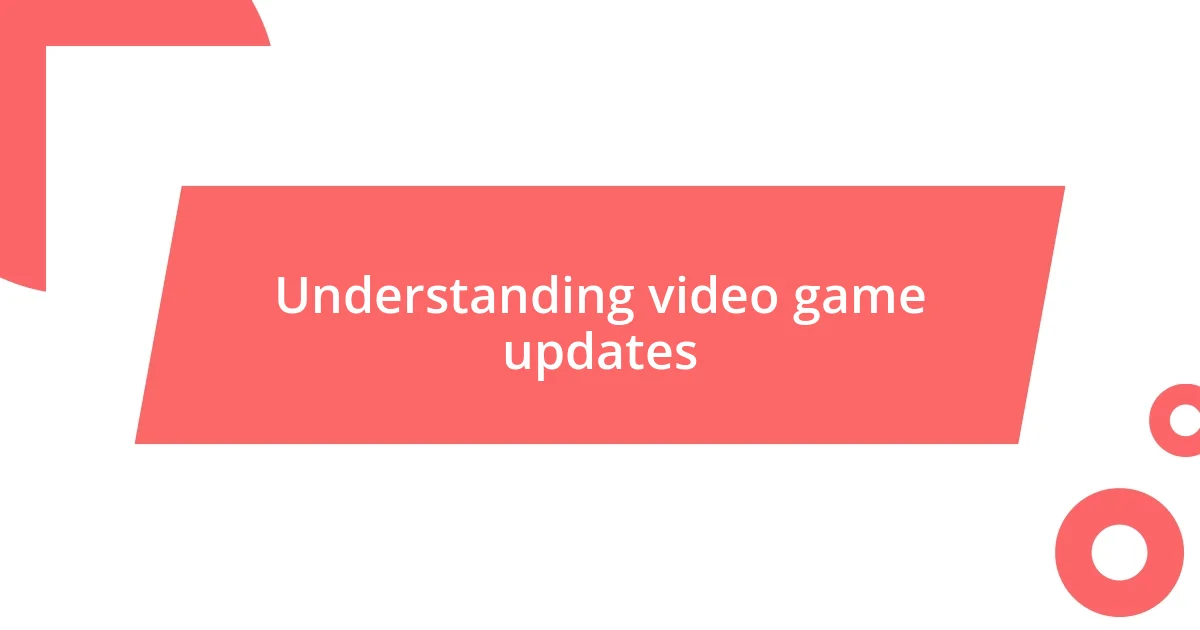
Understanding video game updates
Video game updates can often feel like a double-edged sword. On one hand, they can bring exciting new features and improvements, but on the other, they sometimes introduce bugs and changes that disrupt our gaming experience. I remember when a fabled RPG I loved released an update that promised a new storyline. My excitement was palpable, but when I stumbled upon glaring bugs that made parts of the game unplayable, I found myself frustrated. Doesn’t it make you wonder about the balance developers must strike between enhancing the game and maintaining its integrity?
Updates can also significantly shift the game’s dynamics, altering strategies and gameplay approaches overnight. I’ve had moments where an update completely changed the way I needed to play my favorite character, forcing me to relearn strategies I’d been using for months. It can be a rollercoaster of emotions, right? This constant evolution invites players to adapt and innovate, enhancing our engagement in ways we might not have anticipated.
Moreover, understanding the reasoning behind updates can enrich our overall experience. Developers often provide patch notes explaining the changes, reflecting their response to community feedback. I’ve found that when I take the time to read through these notes, I often gain insights into the developers’ intentions, helping me appreciate the emotional rollercoaster of my gaming adventures. Have you ever felt that moment of clarity after diving into patch notes? It’s like having a backstage pass to the game’s evolution!
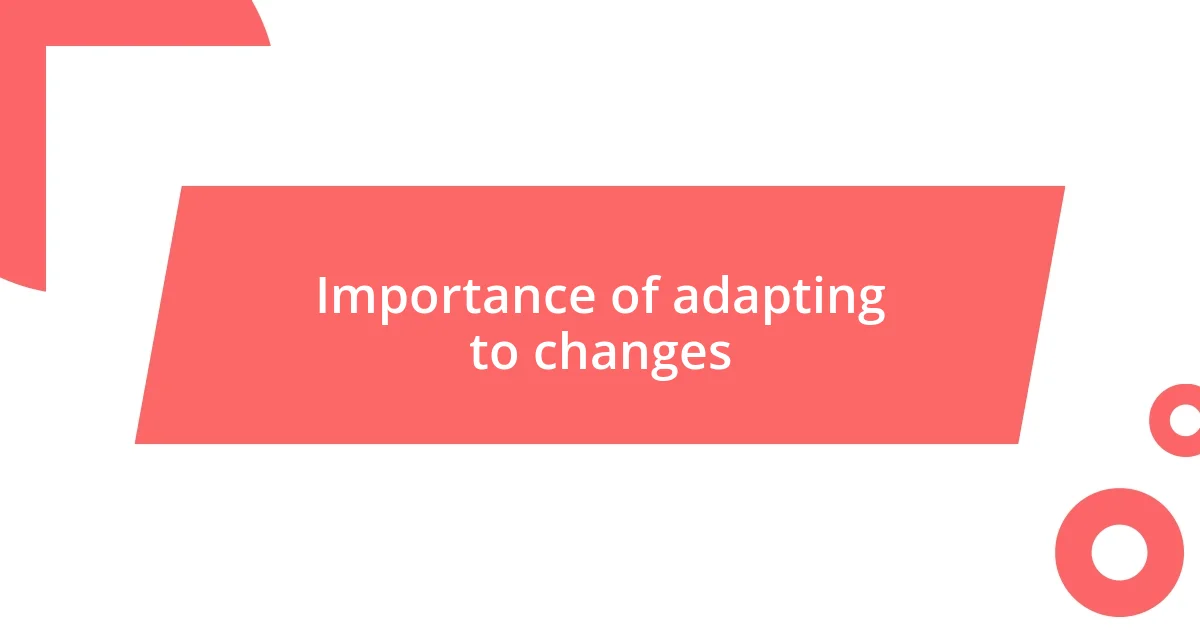
Importance of adapting to changes
Adapting to changes within a video game is crucial for maintaining enjoyment and competitiveness. I remember when a popular online shooter I played switched to a new weapon balance system. Initially, it felt overwhelming; my favorite loadout was rendered ineffective. However, I quickly realized that embracing the change allowed me to explore new strategies and even discover a previously unnoticed preference for a different weapon. This not only expanded my gameplay experience but also enhanced my enjoyment.
Change is the heartbeat of gaming communities. By adapting, we keep our skills sharp and our strategies flexible. I recall a time when an MMORPG I dedicated countless hours to introduced a completely new class. Instead of resisting the change, I dove right in, and I can honestly say it reinvigorated my passion for the game. Sharing experiences with others who were on the same journey fostered a deeper connection within the community, which made the adaptation process more enriching and enjoyable.
When we adapt to updates, we don’t just enhance our gameplay; we also become part of an evolving narrative. It’s fascinating to see how our responses to these changes mirror real-life adaptability. I often think about how the gaming world reflects our ability to overcome challenges, prompting us to think critically and creatively. Has a game update ever inspired you to approach problems in a new light? I certainly feel that my gaming journey has shaped my perspective in many ways.
| Adapting | Staying Stagnant |
|---|---|
| Increased enjoyment and engagement | Frustration and disengagement |
| Enhanced skill development | Missed growth opportunities |
| Deeper community connections | Isolation and discontent |
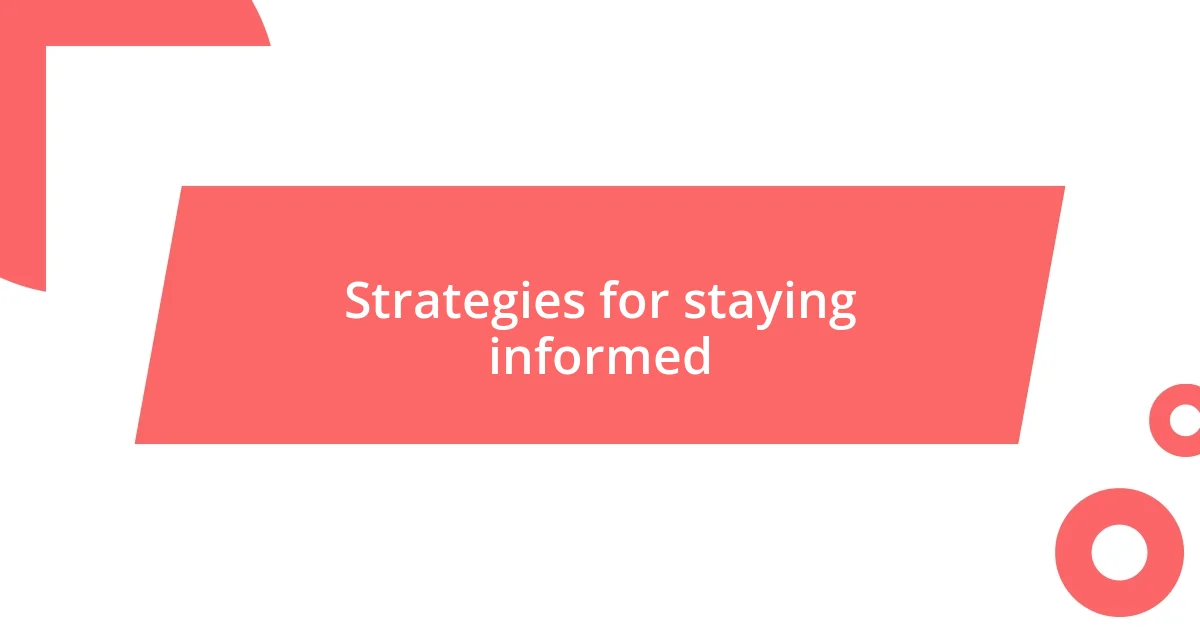
Strategies for staying informed
Staying informed about game updates is essential to fully enjoy and adapt to the ever-changing landscape of gaming. I’ve found that following developers on social media platforms can be incredibly beneficial. It feels like getting real-time updates directly from the source. I still remember the excitement of being part of a live stream where the developers discussed upcoming features and answered player questions. That kind of engagement brings everyone closer and adds a personal touch to the experience.
Here are some effective strategies I use to stay in the loop:
- Check official patch notes regularly: Developers often detail changes and fixes.
- Join community forums or Discord channels: Engaging in discussions helps to share insights and experiences with other players.
- Subscribe to newsletters or YouTube channels: Many creators cover game updates and provide analysis, which I find helpful.
- Attend gaming conventions or online events: First-hand access to developer panels can reveal upcoming changes and create excitement.
Keeping my ear to the ground allows me to adapt swiftly, and over time, I’ve noticed that staying informed enhances my overall gaming experience. Without these strategies, I would feel lost, and I can’t emphasize enough how worthwhile it is to engage with the community and developers.
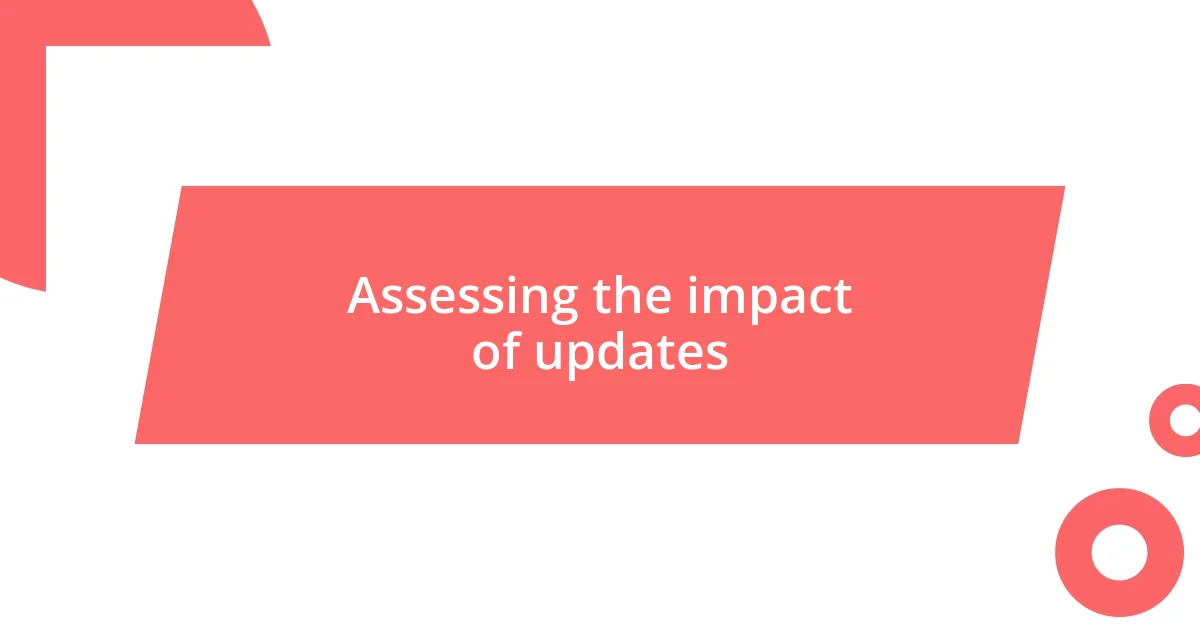
Assessing the impact of updates
Assessing updates can be tricky, especially when the changes shift the game’s dynamics significantly. I recall when a beloved title introduced a new character class that completely altered team composition strategies. At first, it felt like I was playing a whole different game. Taking the time to assess how this new class affected my usual gameplay helped me better understand the benefits and drawbacks, ultimately allowing me to adjust my approach to team battles.
It’s crucial to analyze both the short-term and long-term effects of updates. When a game introduced a significant buff to a weapon I often used, I initially celebrated. However, as I played more, I noticed it led to a surge in players utilizing that weapon, resulting in a fairly imbalanced environment. Reflecting on the broader implications made me rethink my strategies; adaptability became key when facing opponents who also harnessed this newfound strength.
Connecting with fellow players during this assessment can open our eyes to new perspectives. I remember discussing a recent map change in a community forum, where I discovered several players were experiencing entirely different impacts than I was. Their insights not only deepened my understanding of the update but also challenged me to rethink my strategies. Isn’t it fascinating how we can grow and evolve simply by sharing our gaming experiences? It’s a game-changer, literally and figuratively!
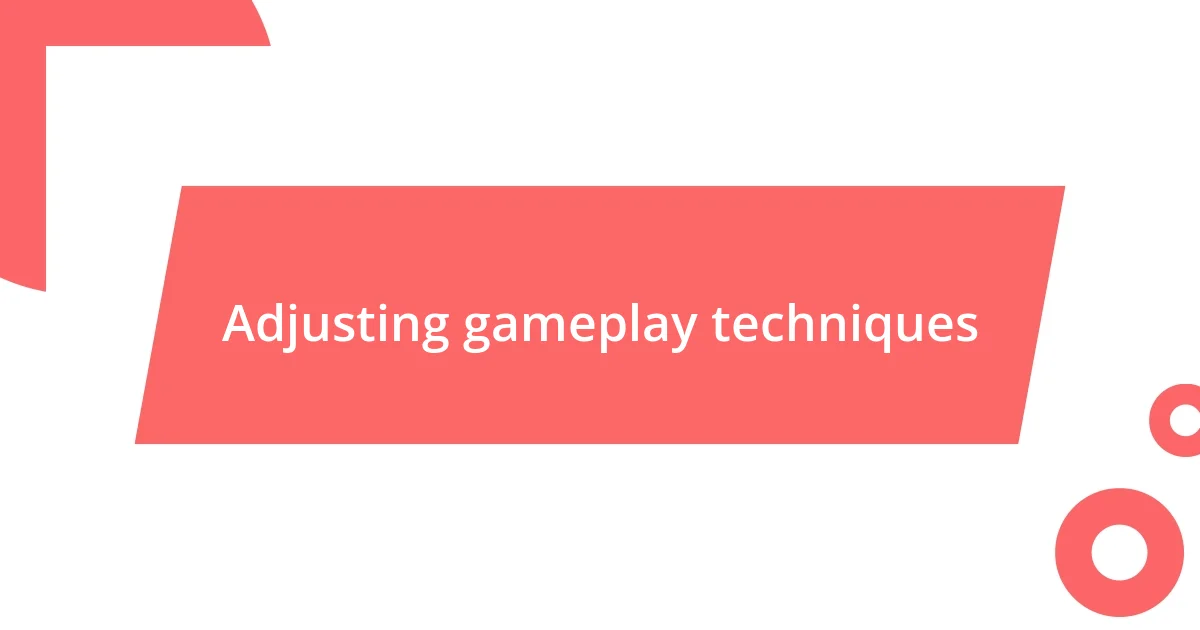
Adjusting gameplay techniques
Adjusting gameplay techniques after an update is an essential part of my gaming journey. Recently, I found myself facing a new challenge when a popular game revamped its combat mechanics. I remember feeling a mix of frustration and determination as I struggled to adapt. It pushed me to experiment with different techniques, like altering my timing and positioning in battles, to regain my competitive edge. Have you ever felt that urge to push through when everything seems off? That motivation can spark creativity in gameplay.
One of the most effective adjustments I’ve made involves honing my reaction time and decision-making skills. I often practice in lower-stakes environments, like playing against AI or friends who are looking to try out new strategies. This way, I can test my new approaches without the pressure of ranked matches. When I finally took those changes into a higher-stakes game, the adrenaline rush was unlike any other! I felt a sense of accomplishment as I successfully executed my refined techniques in tight situations. Adjusting gameplay techniques isn’t just about the gameplay itself; it’s also about building confidence.
Sometimes, I also find it beneficial to learn from the best in the community. Watching high-level players adapt to updates can provide invaluable insights. I recall tuning into a stream where a top player completely reworked their strategy after a recent patch. It inspired me to think outside the box and elevate my own gameplay. Isn’t it rewarding to see how a fresh perspective can ignite new ideas? By embracing these changes, I’ve found that not only do I keep pace with the game, but I also grow as a player.
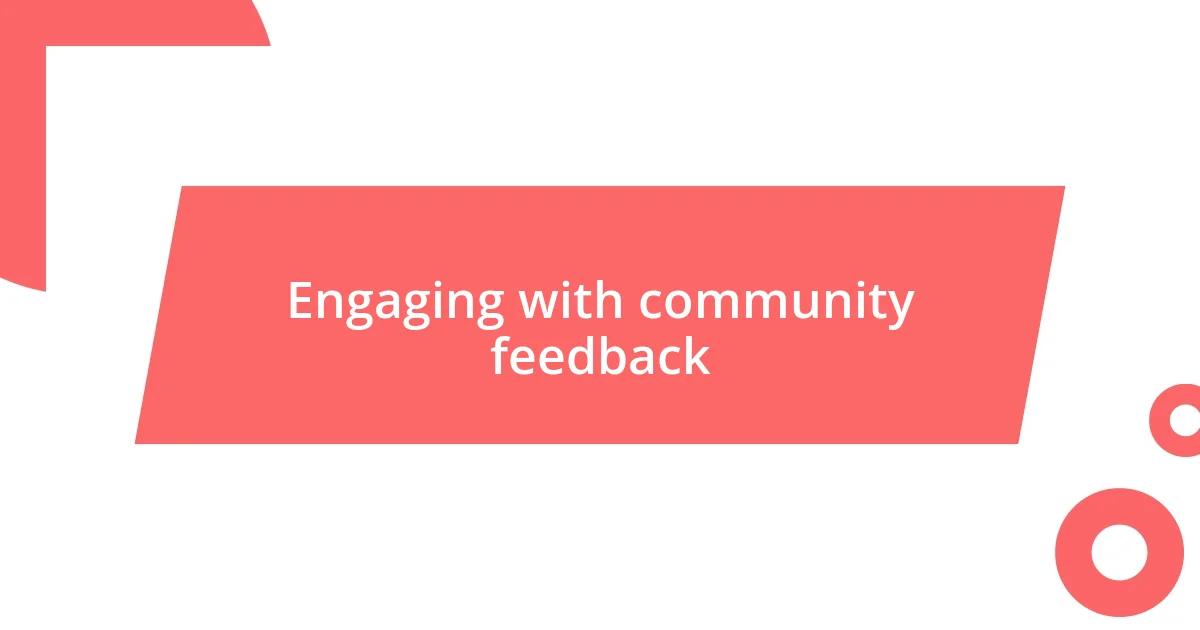
Engaging with community feedback
Engaging with community feedback is a dynamic part of adjusting to game updates. I often dive into forums and social media to see what my fellow gamers are saying, especially after major patches. The thrill of discovering a new strategy or addressing a frustrating tweak together can turn a simple game update into a collaborative adventure. Have you ever read a post that perfectly articulated your own feelings about an update? It can be a breath of fresh air knowing you’re not alone in your experiences.
Listening to community feedback has led me to refine my strategies in ways I hadn’t considered before. There was a time when a particular update annoyed me—I felt that the matchmaking system had become inconsistent. After voicing my concerns online and reading others’ replies, I realized it wasn’t just my imagination; many players were in the same boat. This collective dialogue not only made my frustrations feel validated but also encouraged developers to address the issues more prominently. Isn’t it powerful how our voices can echo through the gaming community?
Moreover, I’ve found that taking part in feedback surveys can be incredibly enlightening. On one occasion, I participated in a beta test for an upcoming update. It was thrilling to provide my opinions and suggestions, knowing that they might influence the final product. When I saw some of my ideas implemented post-launch, the sense of ownership was exhilarating—it felt like my gaming experience had truly been shaped by interactions with the community. This connection deepens my enjoyment of the game and reminds me that our collective input plays a vital role in its evolution.

Tracking long-term trends
Tracking long-term trends in gaming updates has been crucial in my journey as a player. I’ve noticed how certain mechanics rise and fall in popularity over time, which often reflects broader shifts in player preferences and gaming culture. For instance, I’ve watched how stealth gameplay styles surged in popularity after a major update that revamped the stealth mechanics in a favorite game of mine. The thrill I felt trying to adapt to this trend was captivating, almost like following a musical trend as it evolves.
Throughout my gaming experience, I’ve kept tabs on how particular strategies emerge after significant updates. There was a point when heavy armor became less favored, and nimble characters took the spotlight. I remember feeling this rush of excitement while altering my play style to incorporate speed and agility. Adapting to this shift taught me to remain flexible and observant—qualities that not only enhance my gaming but also enrich my overall experience. Isn’t it fascinating how the gaming landscape continues to change, compelling us to rethink our choices?
As I reflect on these long-term trends, I recognize the importance of documenting my experiences. Keeping a gaming journal has become a rewarding habit for me. Writing down observations and shifts has helped me connect the dots between updates and changes in community strategies. I often find myself looking back and smiling at past decisions that shaped my gameplay. Don’t you agree that tracking our own evolution in gaming can deepen our appreciation for how we’ve adapted? These moments of reflection remind me that every update is part of a larger story—a narrative that constantly unfolds as we engage with our favorite games.










